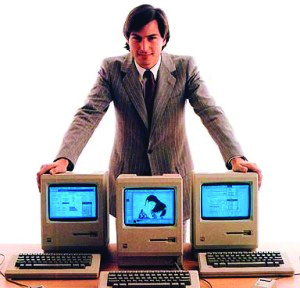Last Sunday, as I hiked at Gilroy’s Mt. Madonna County Park
while listening to my iPod, I pondered about how high-tech gadgets
have saturated our society. Once upon a time, it would have seemed
like magic to carry a slim, inexpensive device that fits into a
pocket and can digitally hold the equivalent of a small bookshelf
of video, music and recorded books.
Last Sunday, as I hiked at Gilroy’s Mt. Madonna County Park while listening to my iPod, I pondered about how high-tech gadgets have saturated our society. Once upon a time, it would have seemed like magic to carry a slim, inexpensive device that fits into a pocket and can digitally hold the equivalent of a small bookshelf of video, music and recorded books. Much of the credit of this immersion of gadgetry into our lives must go to Apple – and its co-founder Steve Jobs.
After Jobs’ death from cancer last month, we’re now witnessing tributes to the man who caused the biggest commotion in the world focusing on fruit since Adam and Eve met a snake in the Garden of Eden. We’re seeing the mythologizing of Jobs. In one sense, we’re onlookers to a secular canonization process that’s now turning him into the patron saint of geeks. The company he founded with Steve Wozniak in 1976 has given the world a hybrid of design and engineering in its line of products, which are the high-tech holy relics reflecting Jobs’ complex personality.
Those who worked with Jobs at Apple knew him as a genius and a jerk. As a technology journalist for a Silicon Valley-based news service, I had opportunities to chat with people who worked under his looming CEO shadow. The picture I got of him from those conversations was of a man who was neither sinner nor saint. He was a complex human character embodying both the best and the worst of Silicon Valley’s business world.
Under Job’s leadership, Apple transformed how the world thinks of personal computers, telephones, music and even retail stores. His innate knowing of what people wanted led him to bring a chic design sense to the digital, taking high-tech out of the geeky world and making it super cool.
Now with his passing, Jobs is being compared to Albert Einstein, Thomas Edison, Henry Ford and other inventive minds. I would like to suggest that Jobs’ real genius lies in how he shaped Apple into a company that revolutionized how people look at high-tech. Jobs’ genius was that he understood the importance of making information and communication technology easy for ordinary people to incorporate into their daily lives. Jobs mastered the art of technology and the technology of art.
Before the ground-breaking Apple II computer launched in 1977, computer technology existed for most people either in the realm of science fiction (such as the murderous “HAL” in the movie “2001”), or as machines filling cavernous chambers that demanded an army of technicians to control. There had been “personal computers” before the Apple II, but they sold mainly to geeky hobbyists. Wozniak and Jobs brought computing to the personal level – and helped in the evolution of these machines being seen as friendlier devices.
Jobs makes a fascinating personality study. He possessed a complex temperament that, like the Cupertino-based company he built, surprises with its many puzzling facets. Some described him as a control freak with a dictatorial bent making him insensitive in his dealings with other people. When Apple went public in 1981, for example, Jobs stiffed his early employees out of stock options. Jobs could be narcissistic, an ego-driven individual who used intimidation tactics to get his way. He also had weirdly compulsive behavior patterns and could abandon those he loved, perhaps a deep-seated trauma from being abandoned at birth by his natural parents.
A study on “Disordered Personalities at Work” published in 2005 by Belinda Board and Katarina Fritzon, two psychologists at the University of Surrey in England, looked at personality features between successful business managers and hospitalized psychopathic criminals. It discovered that top executives tend to exhibit histrionic personality disorder more than criminal psychiatric patients. Among these were “superficial charm, insincerity, egocentricity and manipulativeness.” The business leaders’ personalities also demonstrated narcissistic traits such as “grandiosity, self-focused lack of empathy for others, exploitativeness and independence.” Personality disorder traits in managers such as “perfectionism, excessive devotion to work, rigidity, stubbornness and dictatorial tendencies” were also higher than in psychotic criminals.
The study raises an intriguing question about leadership personality in the business world. Does business genius require a disordered personality? I would argue that, to a degree, it does. Business leaders like Jobs must possess a tremendous grandiosity, believing in themselves and their vision.










